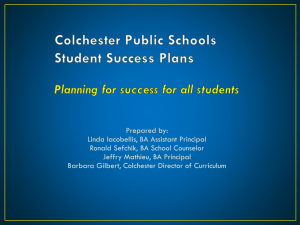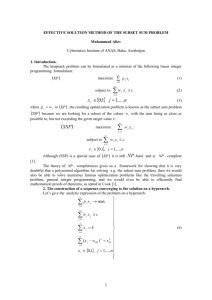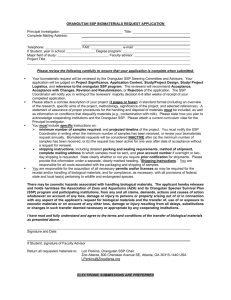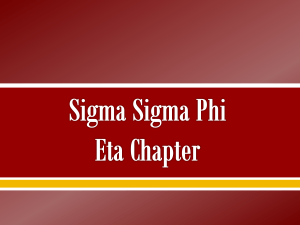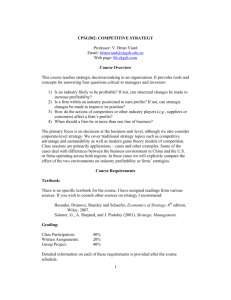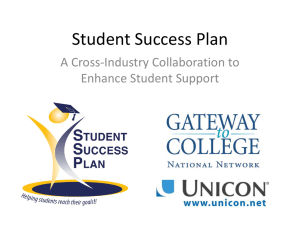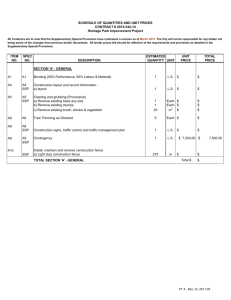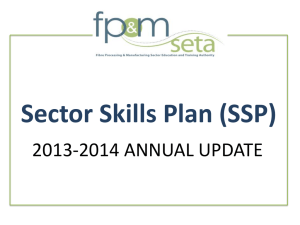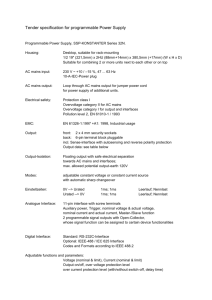Region 14
advertisement
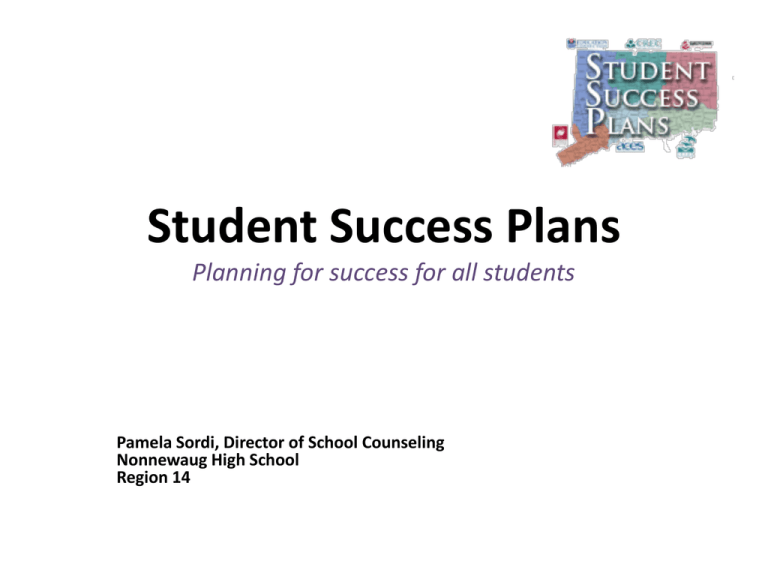
Student Success Plans Planning for success for all students Pamela Sordi, Director of School Counseling Nonnewaug High School Region 14 Student Success Plans “For the school year commencing July 1, 2012, and each school year thereafter, each local and regional board of education shall create a student success plan for each student enrolled in a public school , beginning in grade six. Such student success plan shall include a student’s career and academic choices in grades six to twelve, inclusive.” 2 What is a Student Success Plan? Purpose Components Development 3 The Mission To prepare EVERY student for learning, life, and work in the 21st century. © Corwin Press – 2011 © JPC Sr. Objectives for Student Success Plans Prepares students for: □ postsecondary education, life, and careers □ competition in a dynamic global economy Provides students: □ opportunity to design their own future with the support of critical adults and innovative school policies □ opportunity to know and understand self in a positive learning environment 5 Components of Student Success Plans 21st Century Skills • Critical Thinking • Problem Solving • Innovation • Creativity • Self-Direction • Work Ethic • Collaboration • Written Communication • Information Technology • Leadership Professional Skills CT’s Comprehensive School Counseling Curriculum • Interpersonal • Work & Personal Ethics • Communication • Attendance • Interview Abilities • Attitude • Teamwork • Time Management • Organizational Leadership • Cultural Awareness Foundation: Rigorous academic courses and a related sequence of elective courses aligned to a specific career pathway in providing: •Experiential Learning: Job Shadows, Internships, Community Service •Dual/Concurrent Credit •Capstone Project • • 21st Century and Professional Skills across-the-curriculum Evolving post-secondary plan June Sanford 11/19/2007 6 Key to Student Engagement An individualized flexible student-driven plan Helps every student stay connected in school Helps students achieve post-secondary education and career goals Begins in 6th grade and continues through high school and beyond Establishes an adult support team which may include teachers, counselors, school psychologists, social workers, parents/guardians, community members, etc. Provides student support in setting goals for personal and academic growth Explores education, interests and career paths Provides a vehicle for integration and demonstration of 21st century skills Utilizes an electronic system for efficiency and portability (when possible) 7 Required Areas of Development Academic Development Career Development Social, Emotional & Personal Development 8 Academic Development Acquiring skills, knowledge, attitudes to be effective learner and for life Specific Model Criteria: Rigorous courses linked to interests, skills and career pathways Courses for the attainment of Education and/or Career goals Successful completion of Portfolio/Capstone Project Support & Assessment of Student Progress with Mentor/Advisor Timely Intervention and Student Support Learning experiences outside of the classroom 9 Career Development Acquiring skills needed to investigate world of work and achieve future career success Specific Model Criteria: □ Interest and ability inventories □ Career exploration and interest courses □ Post Secondary Education and Career Pathway Development □ Experiential Learning (i.e., work-based learning, community service, capstone project) 10 Social, Emotional & Physical Development •Developing an understanding of and respect for self and others •Understanding the necessary steps for decision-making and goal attainment •Acquiring safety and survival skills Specific Model Criteria: Empathetic Interactions and Community Service Self Regulation and Resiliency Healthy and Safe Life Skills/Choices Broadened Awareness of Self within a Global Context Identification of School and Community Resources 11 What do we already do? What do we want to do? © JPC Sr. How will we do it? 2012 How it all comes together 1. 2. 3. 4. 5. 6. Attend Professional Development– Become familiar with specifics of SSP’s Establish SSP team – Create a team to guide SSP development in your school Talk to those who have established SSP’s– Learn what others do and use what works for your students and your schools Identify supporting technology– define systems that will align with your SSP’s to support SSP components and provide documentation Review current programs and state guidelines – identify components already in place, revise if necessary, and add to areas identified as gaps Identify how, when and by who - SSP’s will be developed for each student in your school SSP development will evolve 1. Implementation– Implement SSP’s 6-12. Remember students individualize and drive their own plan 2. Collaboration– Who will be involved; teachers (through advisory, classroom, etc.) How are parents involved? 3. Review, Analyze and Revise – Continued meetings with SSP team 4. Evaluate -SSP & make changes 5. Hold annual district meetings -to ensure systemic SSP development What the SSP is not SSP • The sole responsibility of school counselors • SSPs are only necessary for students who are not meeting age and/or grade level expectations • An electronic system • A plan to begin in grade 6 with a gradual role out • A plan that tracks students into a career path beginning in gr. 6 • An inflexible career track • A plan that requires an electronic system ©Rinaldi, Ellington High School CT State Dept. of Education 16 The Middle School SSP Survey SSP Sample Components 1. 2. 3. 4. 5. 6. An ACADEMIC goal I have for 6th grade is: A PERSONAL or SOCIAL goal I have for 6th grade is: Five words that describe who I am today are: My strengths are: I need to improve: Which one most accurately describes my plans for after high school at this time? (Drop down menu choices: 4 yr. college, 2 yr. college, Military, Employment, Other) 7. My dream career is: 8. When I'm not in school, I like to: (include hobbies, sports, clubs, etc.) 9. My Awards, Honors, and Activities: 10. If I could have just one wish granted, I would wish for... because... 11. A person I admire is: 12. If I could live any place in the world I would choose... because... 13. If I could do anything to "Be the change I wish to see in the world", I would: 17 Student Success Plan – Grade 6 Guaranteed experiences that incorporate 21st Century Skills into the academic (A), personal/social (P/S), and career (C) domains Grade 6 SSP Survey (Academic Questions) Setting & Updating S.M.A.R.T. Goals (Advisory) Transition Planning for Middle School (Multiple Intelligence Survey) Career Key Interest Inventory Career Exploration & “My Favorites” List Grade 6 SSP Survey (Social & Emotional Questions) Activity Resume (Advisory) School Satisfaction Survey 18 Student Success Plan – Grade 7 Guaranteed experiences that incorporate 21st Century Skills into the academic (A), personal/social (P/S), and career (C) domains Grade 7 SSP Survey (Academic Questions - Naviance) Setting & Updating S.M.A.R.T. Goals (Advisory) My Personal Inventory (Naviance)Career Development Continue Career Exploration & “My Favorites” List (Naviance) Social, Emotional, & Physical Development Grade 7 SSP Survey (Social & Emotional Questions - Naviance) Update Activity Resume (Advisory) School Satisfaction Survey (Naviance) 19 Student Success Plan – Grade 8 Guaranteed experiences that incorporate 21st Century Skills into the academic (A), personal/social (P/S), and career (C) domains Grade 8 SSP Survey (Academic Questions) Setting & Updating S.M.A.R.T. Goals Transition Planning for High School Career Clusters Inventory Career Exploration & “My Favorites” List Career Project – related to Career Day Grade 8 SSP Survey (Social & Emotional Questions) Update Activity Resume School Satisfaction Survey MS/HS Transition Survey 20 Student Success Plan – Grade 9 Guaranteed experiences that incorporate 21st Century Skills into the academic (A), personal/social (P/S), and career (C) domains Freshman Orientation Freshman Success – Transition to High School Individual Planning Sessions 4-Year Academic Planning Personal Reflections Classroom Curriculum-Goal Setting Career Fair Individual Planning Sessions Advisory – social and civic expectations 21 Student Success Plan – Grade 10 Guaranteed experiences that incorporate 21st Century Skills into the academic (A), personal/social (P/S), and career (C) domains Individual Planning Sessions Update 4-Year Academic Plan Personal reflections guided by portfolio Career Exploration Do What You Are (Personality Inventory) Career Interest Inventory Career Project Career Fair College Panel /Underclassmen Night Advisory - Civic & Social Expectations 22 Student Success Plan – Grade 11 Guaranteed experiences that incorporate 21st Century Skills into the academic (A), personal/social (P/S), and career (C) domains Junior Post-Secondary workshop Individual Planning Sessions Update 4-Year Academic Plan Personal reflections guided by portfolio Post-secondary planning Resume Building Junior Ambassador Program College Fair College Panel /Underclassmen Night Financial Aid Night Advisory - Civic & Social Expectations 23 Student Success Plan – Grade 12 Guaranteed experiences that incorporate 21st Century Skills into the academic (A), personal/social (P/S), and career (C) domains Senior Seminar –the college and post-secondary process Update Resume The College Essay Individual Planning Sessions Update 4-Year Academic Plan Personal reflections guided by portfolio Post-secondary planning Learner Expectation #5 Setting & Updating Career Goals Post-Secondary Planning Decision Days College Representative Visits Advisory - Civic & Social Expectations (Survey) Senior Post-Graduate Survey 24 Electronic SSP’s Components of SSP within Naviance NHS uses Naviance Survey Section SSP’s middle school Personalized Education Plan - Grade 9 Game Plan Survey Do What You Are (personality profiler) Career Interest Profiler Sophomore Career Project Success Planner Post-Secondary Searches Graduation Survey (documentation of finalized post-secondary plans) Journal – Student Success Plan Portfolio 25 Where to get more information CT State Department of Education Secondary School Reform Link SDE Contact Persons: June Sanford, Jocelyn Mackey, Judi Andrews Region 14 School District Pamela Sordi, NHS Dept. Chair of School Counseling psordi@ctreg14.org 203.263.0253 26
